#Also. Did I mentioned about Valjean's old idea of Men and Women(Like most of the humans had at 19th century.)?
Text
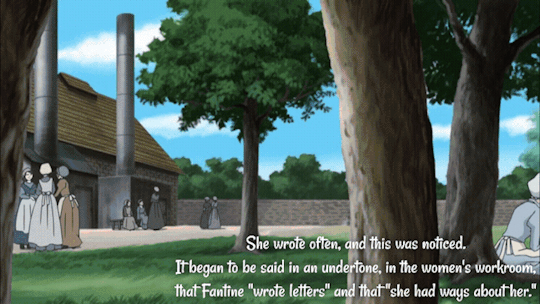
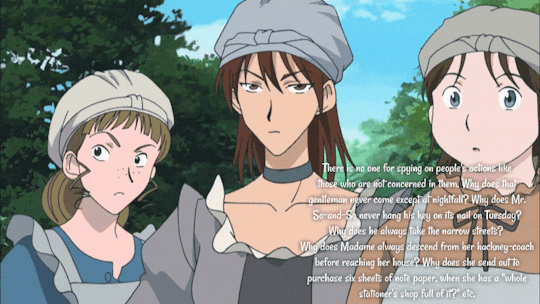
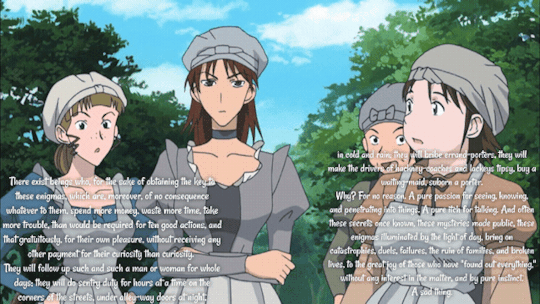
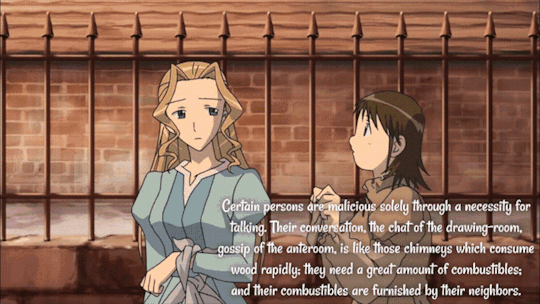
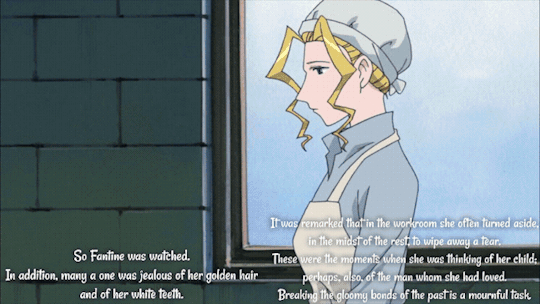

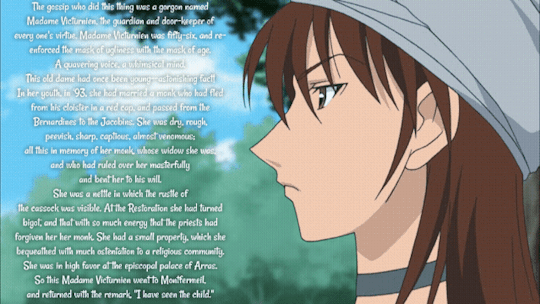
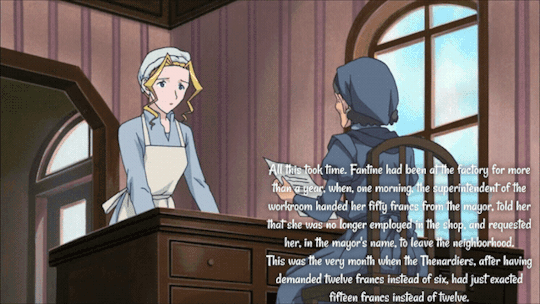
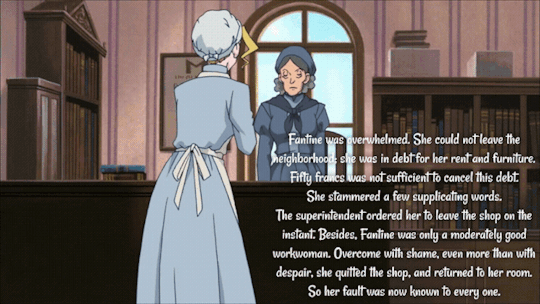
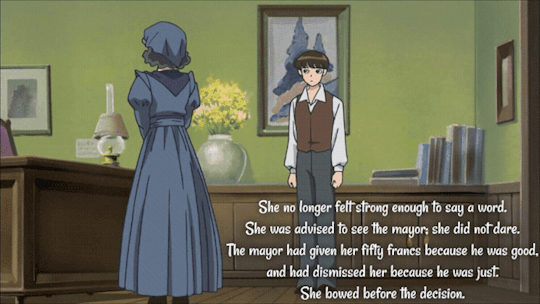
Madame Victurnien expends Thirty Five Francs on Morality. Volume 1, Book 5, Chapter 8.
Clips from <Il cuore di Cosette>.
#Les miserables#les mis#My Post#Fantine#Poor Mother...#Mme. Victurnien#Jean Valjean#M. Madeleine#At the End of the Day#Well. Jealousy and Fake Morality kills a person like this.#Is that all you wanted Victurnien?#You made factory have more 'honest' people#But you made another wh*** on the street!#What's the difference?!#Oh. PLEASE!!#DON'T CARE ABOUT OTHERS AROUND YOU!#Just Take Care of YOURSELF!!#Ah. By the way though in ICDC Victurnien looks like around Fantine's age or a little older and makes this was more related to her jealousy.#Also. Did I mentioned about Valjean's old idea of Men and Women(Like most of the humans had at 19th century.)?#It looks like he's going to pay the price of that in a few chapters later.#THE VERY EXPENSIVE PRICE.#The Brick#Il cuore di Cosette#Les Mis Letters
17 notes
·
View notes
Text
in defense of marius/character analysis
Poor Marius…much maligned, misunderstood Marius. I think he's misunderstood at least in part because book!Marius and musical!Marius are so different, so maybe people get confused? Is he a goofy awkward loverboy or weirdo goth stalker?
The answer is neither, really! Compared to the Amis, Marius is a much more fleshed out and realistic character, and we see him grow and change from the ages of 17-23. But at his core, he is serious, extremely principled, and has a strong sense of honor. His principles provide most of the conflict for him throughout his story:
Independence (Debt is slavery! Refuses to borrow money until forced by his sense of duty; won’t work more than he needs to because he wants his time to be his own, not his employers. Politically, he eventually comes to understand Combeferre’s point about it too, though it contradicts the views he inherits from his father.)
Duty (The main one, and what drives most of his decisions throughout the book. He sees his main duty to be to his father and his final wishes. This is so important to him that he borrows money from Courfeyrac to fulfill what he thinks is his duty to help the Thénardiers. He only goes out at night to make his clothes look black is because he’s in mourning for his father, a culturally expected thing at the time, as is his filial duty. Despite being a republican at the end of the book, he still takes the title of Baron because his father wanted him to. Etc.)
This one is a little harder to define, but I would call it honor, combined with a kind of chivalric sense of respect. (Purity?) Despite leaving his grandfather for not respecting his father, he still respects the man, somehow. Won’t touch Valjean’s money because he’s afraid it may have been ill-gotten. This explains his weirdness around women, too; he is offended by Courfeyrac’s insinuations, outraged that an old veteran *might* have seen Cosette’s stocking, and of course horrified by Gillenormand’s suggestion to make Cosette his mistress. We are frequently reminded how chaste his love for Cosette is. He is, essentially, Tholomyès’s polar opposite.
Loyalty— to his friends, to Cosette, and to his father.
He is also—and this is important—EXTREMELY impulsive.
Marius is not the kind of guy who thinks decisions through. His choices are almost always based on emotion. It is not logical to leave home at seventeen to live in poverty. It is not logical to wax poetic about Napoleon in a room full of radical republicans. It is not logical to resolve to die after learning your girlfriend is moving to England. He is the DEFINITION of doing things “as a matter of principle.”
And this is not an inherently bad trait. His impulsiveness saves the barricade. It’s worth noting that Enjolras, the personification of logic, did not (and would not) think to do this because his mind doesn’t work that way. It’s a terribly risky move and he would not want to risk his men if the soldiers called his bluff. But it works. Marius saves the barricade.
This is probably another reason Enjolras names him a chief of the barricade, because he recognizes Marius has something to offer that he doesn’t.
(Side note: I’m not sure where the idea that Enjolras is irritated by him comes from. He clearly likes Marius.)
“But what about Valjean? The way Marius treats him is undeniably fucked up.”
It sure is, if you know all the facts like we, the readers, do. But in typical Valjean fashion, when Valjean tells Marius the truth, he does not, in fact, tell him the whole truth. He says nothing of his life as Madeleine, of Fantine and his promise, of the Thénardiers, of Javert; in short, he tells him pretty much nothing other than the fact that he is an ex-convict.
But here’s the kicker: Valjean doesn’t know what Marius already knows about him. He has no idea that Marius saw the whole Gorbeau robbery happen while helping Javert, and for whatever reason, he forgets or doesn’t mention that Marius saw him “execute” Javert at the barricade. So from Marius’s point of view, Valjean is a. possibly still involved in crime, as evidenced by his presence there, and b. a murderer who killed Javert for revenge. Thinking this, Marius already knows that Valjean is leaving things out in what he tells him. He worries that what else he didn’t say could be even worse.
Which isn’t to say Marius is completely faultless in this—he’s learning, but his idea of honor can’t comprehend that a convict like Jean Valjean could have raised Cosette.
(Marius) had not yet come to distinguish between that which is written by man and that which is written by God, between law and right. (...) He found it quite simple that certain breaches of the written law should be followed by eternal suffering, and he accepted, as the process of civilization, social damnation. He still stood at this point, though safe to advance infallibly later on, since his nature was good, and, at bottom, wholly formed of latent progress.
But Valjean doesn’t really give him a chance. And when he does discover the truth he immediately begs for forgiveness, though of course it’s too late.
“But you!” cried Marius with a wrath in which there was veneration, “why did you not tell it to me? It is your own fault, too. You save people’s lives, and you conceal it from them! You do more, under the pretext of unmasking yourself, you calumniate yourself. It is frightful.”
“I told the truth,” replied Jean Valjean.
“No,” retorted Marius, “the truth is the whole truth; and that you did not tell. You were Monsieur Madeleine, why not have said so? You saved Javert, why not have said so? I owed my life to you, why not have said so?”
And I’m always sad that that’s something Valjean never gets to learn—by hurting himself, he hurts the people who love him! But that’s a subject for another post (or fix-it fic.)
Is Marius perfect? No, even by the end of the novel he’s not—but that’s the point. He and Cosette are the future. Their character arcs aren’t finished yet.
134 notes
·
View notes
Text
Brick Club 1.5.9 “Madame Victurnien’s Victory”
This is simply a translation thing, since Hapgood translates it as “success,” but I think the title containing the word “victory” is interesting because it really implies that Mme Victurnien got something out of what she did to Fantine, that she “won” against Fantine. What she got was a sense of sated curiosity, a curiosity whose satisfaction ruined another human being.
Hugo starts the chapter off saying that Victurnien’s actions did some good, only he then reveals that Valjean never entered the workshop and explains that the overseer was only charitable from a certain angle. How is this good? Valjean, who is described as “even the best men,” is trusting that this woman’s morals are in line with his own simply from word of mouth, rather than checking in. He never sets foot in the workshop and has given her full power. Again, no wonder people are turning to sex work as a side hustle. How many other women has this happened to? And the overseer thinks she’s doing some good!
The overseer is “full of the charity that consists of giving, though to some extent lacking in the charity that consists of understanding and pardoning.” But isn’t this the entirety of Madeleine’s system and philosophy? He helps people by giving them money. He tosses money at them but doesn’t want to see the aftermath and doesn’t want to be the one doing the face-to-face benevolence. He can’t handle being responsible for problems that a little bit of money can’t fix. The only time he seems to do things face-to-face with others is when they specifically come to him (like as a judge or a settler of conflict); he doesn’t ever go to them. The overseer is full of the “charity that consists of giving” because that’s what Valjean’s rules teach. They don’t have space for sitting down and trying to understand. The morality of these rules don’t allow for that. If the only rule to work in this factory is to be an “honest woman,” how do you confront a structure that creates this desire to seek out and banish immorality rather than examine itself and its components for prejudices and then find ways to assist these women who clearly have little to no support?
I’m wondering too if Valjean’s rule fostered this rumor mill. Having a strict code of morality is a great way to foster ill will if people are more nosey or malicious or less mutual aid-minded than others. Especially in a factory where people are paid by their output. If someone is better than you at the job you share, it makes sense to start a rumor about them to get them kicked out so you become the one who gets their pay. This isn’t quite what happens to Fantine, but I wouldn’t be surprised if it happened to other women. In terms of Fantine and Victurnien, again this strict moral code is a breeding ground for the gossips and rubberneckers that Hugo described last chapter.
Valjean’s system just frustrates me so much. Again, putting so much power in the hands of a person without checking if they’re trustworthy or not, without having a system of “is this person treating my workers right” is just so....careless? That’s not exactly the word I’m looking for but it’s just like Valjean puts this morally strict system in place and expects it to just solve all problems. He’s busy helping other people solve conflicts and things and doesn’t seem to realize that these rules he’s put in place are going to create problems as well. Not to mention that everyone’s ideas of ethics or morals are going to be different. Would Valjean have condemned Fantine if he’d heard her story? We don’t know. But this overseer’s idea of the right thing to do and the right action to take may well be very different from Valjean’s intention upon setting these rules. Which creates circumstances like this.
Am I reading something wrong, or did the overseer not take record that she had given Fantine the 50 francs? I read “of which she rendered no account” as the overseer not bothering to write down the fact that she gave Fantine 50 francs from the money for donation and aid to workers. Is that right? If this is true than it would also give even more reason for Valjean to have no idea: if he doesn’t set foot in the women’s workshop but does look at the expenses, this wouldn’t have shown up either.
The landlord telling Fantine “you’re young and pretty” is a foreshadowing of the next couple chapters, but I also think it’s interesting that the landlord seems to insinuate that she could be a sex worker. Again, this is a garrisoned town. Sex work must be an open secret here, something Valjean maybe refuses to see.
I love Marguerite so much. I think this might be the first and only time Fantine has a friend who actually cares about her. It makes sense that Fantine would have a much older woman as her friend. Hugo says she’s wise, and I think that her sort of quiet wisdom would resonate more with someone much older than with grisettes her own age. Plus an older person might be much more patient with her when teaching her these new ways of living and maybe guiding her through actually noticing these social cues for the first time. Marguerite is kind of like Fantine’s Myriel; she is a pious and religious old woman who takes Fantine under her wing to learn how to live and survive. Only, rather than taking Fantine’s soul for god or anything, she’s giving Fantine a friend, which seems to be something she’s never had before. This is the first time we see Fantine talking to someone else as an equal.
Hugo mentions that Marguerite taught Fantine how to give up an expensive bird. It’s odd to me that this bird is never mentioned. When did she get a bird? If it was with her in Paris why did she not sell it to move to M-sur-M? However, I 100% understand owning a pet even when you barely make any money to buy yourself food. Pets make you feel better about yourself because you’re caring for and getting love from another creature. Fantine has now had to give up Cosette and her bird, both two small things she’s able to give her love to.
Fantine’s backstory is so odd. How did she not know how to “live poor” already? She was an orphan, and as we see later, orphans in the Brick (taken in or otherwise) are generally treated poorly and are exceedingly impoverished. How had she never lived in enough poverty to learn how to reuse things and give things up? This is clearly the most poor she’s ever been, and even Feuilly makes a good deal more than her later on, but it seems strange that even as a young child or teenager she didn’t live in similar poverty, if she was an orphan with no other monetary support besides her own work.
Fantine mentions that she only sleeps five hours a night. We don’t get a lot of mention of characters sleeping. A little here and there, but the Thenardiers don’t seem to sleep, like, at all when they’re in Paris. This is a kind of subtle aspect of it, but being this poor is crazy hard to get out of because it requires so much work. Fantine makes like 9 sous (I think?) making shirts. She’s taking up just under 19 hours of her day sewing, which I would imagine might produce maybe 3 shirts? Depending on whether she’s doing the entire thing from scratch or using patterns or taking someone else’s already fitted and cut out pieces and stitching them together. Either way, sewing takes quite a while, and if she’s taking 19 hours of her day doing that, she has no time to do things like look for a better job. And she’s also still in debt, so she can’t move somewhere with more opportunities, either. The Thenardiers barely sleep because they’re constantly trying to come up with ways to get money as well. Marius seems to barely sleep; he spends his time translating. Sleep is so rare in this book, it’s kind of a surprise when it’s mentioned.
“When one is sad, one eats less. Sufferings, troubles, a little bread on the one hand, a little anxiety on the other--all that will keep me alive.” More of Hugo’s weird thing about suffering. Even more than an ableism kink, he’s got this whole suffering = good thing going on. This is from 3.5.1, about Marius, but I think it summarizes Hugo’s opinion well: “Firm and rare natures are thus created; misery, almost always a step-mother, is sometimes a mother; destitution gives birth to might of soul and spirit; distress is the nurse of pride; unhappiness is a good milk for the magnanimous.” (Hapgood translation as I’m too lazy to transcribe from FMA.) Reaction to suffering is Hugo’s gauge for a character’s goodness.
Also, this line about bread reminds me of Eponine’s line about not eating for three days, only Eponine admits to the misery of not eating, while Fantine tries to keep things light and optimistic. Again, we have Fantine seeing things through a sort of rose-colored lens. This time I don’t think it helps much, but it’s also not concealing danger from her either. It’s just that Eponine has lived so long in poverty that hunger is just an aspect of her life, and misery is something she seems to have simply accepted, while this is still vaguely new to Fantine and she’s trying to figure out how to deal with it.
“In this distress, to have had her little daughter with her would have been a strange happiness.” Mostly I just want to hang on to this quote because it parallels the later line talking about Baron Pontmercy wishing to have young Marius with him. I made a post before about the parallels between Fantine and Pontmercy, and somehow I didn’t catch this one, but here it is.
Everything in this book is about money, about how to pay. Everything in life is about money. It puts Valjean in an expressly unique position as someone who has a frankly ridiculous amount of money compared to pretty much every other character. But everyone except Valjean and Cosette are so highly aware of money, of how much everything costs, and what it takes to pay for something. And really the thing about poverty is that “cost” isn’t just francs, it’s also time and labor and emotion. If Fantine had just the tiniest bit more money, she could send for Cosette, but would Cosette then end up like the child of Valjean’s sister, sitting out in the cold in the early morning after Fantine went to work but before the schools had opened? Sewing shirts takes time; that’s either less time to be with Cosette and nurture Cosette or less time making shirts which is less money. Making enough money to live means sacrificing so much.
Only now does Fantine seem to be aware of social cues, which now have turned into paranoia (though she’s probably at least a little right). Since the beginning, she hasn’t noticed when people are laughing at her or whispering about her or making fun of her to her face. Even when Tholomyes left, I doubt she noticed because all of the grisettes were abandoned at the same time; I don’t think she would have realized that for everyone else it was a little bit different. But now all those whispers and mocking and social cues have been thrown in her face, and now she’s seeing them everywhere. It sounds like paranoia, but I think she’s right, and Hugo basically says so about a sentence later.
“She came and went, head high and with a bitter smile, and felt that she was becoming shameless.” This is another reason why I Dreamed A Dream in English frustrates me so much. The French version at least touches on Fantine’s anger, on the ways she has begun to harden. The English version really does not do that at all. It is interesting that she longs for the anonymity of Paris, and in the end seems to decide to treat M-sur-M as though it was Paris, and go out brazenly anyway.
Mme Victurnien and Tholomyes are at opposite ends of the self-centered individual. Tholomyes fucked Fantine over but didn’t care or think much of it, because once he’d satisfied the amusement he got out of his affair with Fantine, he simply dropped her and probably never thought of her or Cosette ever again. Victurnien, on the other hand, turns Fantine into a weird sort of obsession. Instead of not caring about ruining Fantine’s life, that becomes a kind of pleasure for her. A “dark happiness,” as Hugo calls it. It’s a sort of sadistic schadenfreude. Tholomyes didn’t spend anything to abandon Fantine, he simply left to go back to the country. Victurnien spent money to destroy Fantine’s life. Both are so terrible because one is so deliberately careless and the other is so heartlessly deliberate.
A last thought which is just kind of a throwaway thing, but since gaining the “Fantine as autistic” headcanon from whoever it was that came up with it, I’ve been imagining Fantine’s love of brushing and braiding her hair as a form of self-soothing. I haven’t had long hair in over 15 years but I remember when I did, brushing it or having someone else brush it always felt really nice. Fantine’s hair is so beautiful (later on Hugo says it falls to her knees which is !!!!) and I wonder if part of that is because of how often she uses brushing it to self-sooth when things are terrible.
8 notes
·
View notes
Text
Thoughts on the re-staged tour
Strap in for a long one because I saw the re-staged tour of Phantom last night.
The Bad
The sets looked very cheap and felt more at the level of a high school/college production than a professional national tour. They also looked less like the interior of an opera house and more like Jean Valjean’s factory from the 2012 Les Mis movie.
Ditto on the costumes. Okay, maybe that is a little extreme, because for most of the show, they did actually closely resemble the original designs. The problem really came with “Masquerade.” The women were just wearing dresses that resembled the original designs; so Christine’s dress had the same color pattern as the Star Princess costume but lacked the detail, Carlotta’s didn’t have the bat wings and gothic trimming, etc. The men (except Raoul) were just wearing tuxedos with masks; Raoul still wore his navel uniform, which made him look a little out of place as the only man wearing a “costume.” The Red Death costume was extremely toned down; it was a cross between the 1925 and 2004 movies. While that worked for film, it falls flat on stage. All of the standout costumes from the chorus like the money playing the cymbals, the butterfly, the half man/half woman, etc. were gone. All of the life, color, and grandeur that you expect from this number were just sucked right out of it. It was a travesty.
I missed the Phantom’s hats. I didn’t realize until it suddenly wasn’t there; the Phantom’s hats give him such a regal air during the scenes when he wears them. “POTO” felt incomplete without that hat toss.
The blocking was just generally awful. Of course there were the more egregious sins such as having the gendarmes momentarily back off so the Phantom can propose to Christine, the now infamous bed throwing in the final lair, and Christine neither taking off the mask during the first “unmasking” or giving the Phantom his ring back. There were also changes that made some of the dramatic moments pretty anti-climactic. During “Il Muto,” the Phantom simply slips a noose around Buquet’s neck and hoists him up on the side of the stage instead of dramatically tossing his body from the rafters. His entrance during “Masquerade” would be easily missed if not for the music cue because he’s just down on the dance floor with everyone else instead of cutting an imposing figure at the top of the grand staircase. There were also the overall issues of the characters physical movements not matching up with what they were singing and a lot of the characters just standing around when they needed to move.
They were trying way too hard to make “PONR” sexy. The song itself is sexy enough on its own. It doesn’t need Christine rolling around/dancing on a table or the Phantom teasing her with fruit, or for Christine’s dress to be slit up to her waist. Someone needed to tell the director that less is more.
The Good
During “I Remember…” we see the Phantom getting his notes ready to send to the managers. I just thought that was a nice little touch.
When Madame Giry tells Raoul what she knows about the Phantom, there is a shadow play in the background depicting his life in the carnival and his escape.
Despite what I said about the sets looking cheap, the stairs coming out of the wall during “POTO” was a pretty cool effect.
There were no fucks given when dropping the chandelier. That thing went flying to its doom.
“Prima Donna” still gave me goose bumps.
The cast was fantastic; it was worth seeing it just for them. Everyone gave stunning vocal performances, but I need to mention the big three:
Eva Tavares – Her Christine was feisty and by the time of the final lair, was so done with the Phantom’s shit. The new bit where she tears up his music felt very justified and cathartic. This was a women who was done with being manipulated and she was destroying the instrument of his manipulation.
Quentin Oliver Lee – His Phantom was a bit on the softer side and very straight forward. I have to say that his acting seemed at odds with the direction, but in a good way. It was as if the direction was calling for him to be irredeemably bad and but his acting was pushing through that to try and make the Phantom a sympathetic character (which he should be if the story is being told correctly.)
Because of this, some of the cringe inducing moments during the final lair were slightly less cringe-y. When he’s taunting Raoul after lassoing him up he just got right in Raoul’s face and told him what was up instead of dancing around/taunting him. When he throws Christine on the bed, it came across more as him trying to keep her away from Raoul than intentional sexual assault. There’s also a moment when he has her pinned down where you can see him realize that he’s gone too far and then lets her go. It’s still the most uncomfortable moment in the show for me, but I thought he played it in a way that was less blatantly sexual.
Jordan Craig – His Raoul was a bit more on the aggressive side. I also felt like the character of Raoul was being ret-conned to fit with LND. In the prologue he’s not as old and decrepit. He’s also got some anger issues going on. (ETA: I didn’t notice this until now, but the program actually was changed to vague up the timeline. The main story now takes place sometime in “the late 19th century.”)
And bonus: Trista Moldovan – When I saw her name in the cast list, I was so geeked because I had no idea she was in the tour. Her Carlotta was very elegant and haughty. She was no over emotional or distraught diva; she was a professional who had been disrespected and wasn’t going to allow that shit to continue. I loved every minute that she was on stage.
All in all, I’m not disappointed that I saw it. At the very least, the music was fantastic as always, so I enjoyed it on that basis alone. I also feel a little more justified in shit talking this production now that I’ve seen it in person with the full magic of the live theater experience behind it. It also makes me appreciate Maria Björnson, Gillian Lynne, and Hal Prince even more than I already did. Without their immense talent, the original production could have turned out like this hot mess...
6 notes
·
View notes